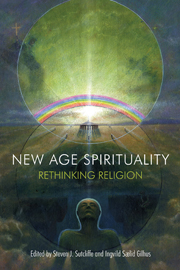Book contents
- Frontmatter
- Contents
- Introduction: “All mixed up” – thinking about religion in relation to New Age spiritualities
- Part I Rethinking New Age spiritualities
- Part II Comparing New Age beliefs and practices
- Part III Putting new spiritual practices to work
- 11 Beyond the spiritual supermarket: the social and public significance of New Age spirituality
- 12 From New Age to new spiritualities: secular sacralizations on the borders of religion
- 13 Cognitively optimal religiosity: New Age as a case study
- 14 Theorizing emotions in New Age practices: an analysis of feeling rules in self-religion
- 15 Doing things with angels: agency, alterity and practices of enchantment
- Conclusion: New Age spiritualities – “good to think” in the study of religion
- Contributors
- Further reading
- Bibliography
- Index
11 - Beyond the spiritual supermarket: the social and public significance of New Age spirituality
from Part III - Putting new spiritual practices to work
- Frontmatter
- Contents
- Introduction: “All mixed up” – thinking about religion in relation to New Age spiritualities
- Part I Rethinking New Age spiritualities
- Part II Comparing New Age beliefs and practices
- Part III Putting new spiritual practices to work
- 11 Beyond the spiritual supermarket: the social and public significance of New Age spirituality
- 12 From New Age to new spiritualities: secular sacralizations on the borders of religion
- 13 Cognitively optimal religiosity: New Age as a case study
- 14 Theorizing emotions in New Age practices: an analysis of feeling rules in self-religion
- 15 Doing things with angels: agency, alterity and practices of enchantment
- Conclusion: New Age spiritualities – “good to think” in the study of religion
- Contributors
- Further reading
- Bibliography
- Index
Summary
In most of the social-scientific literature, New Age – or “spirituality”, as increasingly seems the preferred term – is used to refer to an apparently incoherent collection of spiritual ideas and practices. Most participants in the spiritual milieu, it is generally argued, draw upon multiple traditions, styles and ideas simultaneously, combining them into idiosyncratic packages. New Age is thus referred to as “do-it-yourself-religion” (Baerveldt 1996), “pick-and-mix religion” (Hamilton 2000), “religious consumption á la carte” (Possamai 2003) or a “spiritual supermarket” (D. Lyon 2000). In their book Beyond New Age: Exploring Alternative Spirituality, Sutcliffe and Bowman (2000: 1) even go so far as to argue that “New Age turns out to be merely a particular code word in a larger ield of modern religious experimentation” while Possamai (2003: 40) states that we are dealing with an “eclectic – if not kleptomaniac – process … with no clear reference to an external or ‘deeper’ reality”
This dominant discourse about New Age basically reiterates sociologist of religion Thomas Luckmann's influential analysis, published about forty years ago in The Invisible Religion (1967). Structural differentiation in modern society, or so Luckmann argues, results in erosion of the Christian monopoly and the concomitant emergence of a “market of ultimate signiicance”. On such a market, religious consumers construct strictly personal packages of meaning, based on individual tastes and preferences.
- Type
- Chapter
- Information
- New Age SpiritualityRethinking Religion, pp. 174 - 196Publisher: Acumen PublishingPrint publication year: 2013



